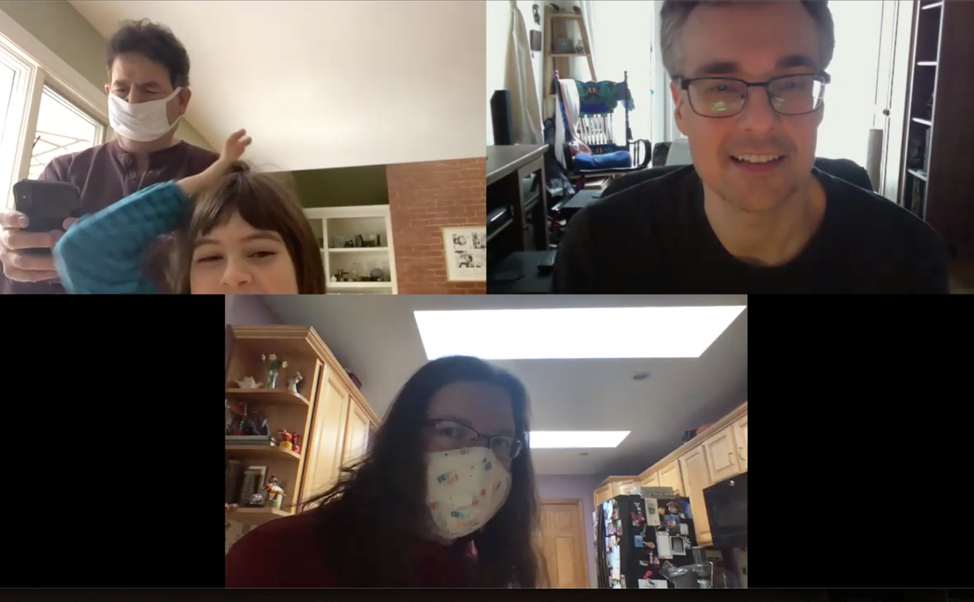Projects
Training program
Imagine that …
How do you get people ready to act in a crisis if you only have their attention for a few hours every few years?
A different approach to preparedness
Our learning experiences immerse a micro-community, such as a group of neighbors, in a real-time role-playing crisis simulation. They experience some of the shock, confusion, and chaos of crisis. Without any advance preparation, participants must work together to improvise and adapt solutions to realistic challenges.
Learning to act
Our immersive learning experiences engage people in their everyday settings. Our goal is to foster the confidence they need to act in the face of uncertainty, rely on themselves, and improvise creative solutions with strangers. The experience also motivates participants to act on best practices for preparedness.
Learning by discovery
Experience is the best teacher. Our immersive simulations provide a stimulating setting in which people can discover their own capabilities and make mistakes safely. We incorporate live-action roleplay techniques to make experiences fun, and keep participants emotionally and intellectually engaged.
Learning together
Our immersive learning experiences increase social resilience by engaging everyone in the micro-community with challenges that require both individual and collective action. This experience encourages families to assess their own state of readiness, take responsibility for the well-being of their micro-community, and connect to a larger network of community resources.
Whole community learning
Communities that play together before a crisis stay together in a crisis. We work with community organizations to enable them to deliver our immersive learning experiences in their communities. In this way, community organizations forge new connections, deepen their understanding of local needs, and increase community engagement.
See how it works
Training projects
Project
Board Game
Our shortest learning experience, designed to be a quick and fun activity that provokes individual households to THINK about wildfire preparation.
- For 1 or more household members
- 10-15 minute
- One game facilitator
- Available in English and Spanish
LEARN MORE about the Board Game →

Project (completed)
Earthquake pilots
Our pilot learning experience invites a group of neighbors to “get through” the weeks following a catastrophic earthquake. They solve challenges in their own homes, and around the neighborhood, with only the people and resources at hand.
LEARN MORE about the project →

Project (completed)
Pandemic earthquake
In the midst of disaster, we continue to prepare for disaster. We have adapted our neighborhood earthquake to happen in the presence of COVID-19, and we conduct the simulation by videoconference. Participants face the same challenges, but the neighborhood is virtual.
READ ABOUT the virtual pilot →
From our blog

Fall 2024 Update: My, how time flies when you’re having fun!
Our Fall 2024 Update is out! Get the scoop on what’s been happening at Creative Crisis Leadership in the past nine months!

Help us to measure impact: Researcher needed!
We’re looking for a highly motivated researcher to design and implement a study to evaluate the short-term impact of our wildfire learning experiences.

“It’s been mobbed!”
Most disaster preparedness educators have a fantasy about people lining up to learn about disaster preparedness. It’s our reality. …
From our blog

Fall 2024 Update: My, how time flies when you’re having fun!
Our Fall 2024 Update is out! Get the scoop on what’s been happening at Creative Crisis Leadership in the past nine months!

Help us to measure impact: Researcher needed!
We’re looking for a highly motivated researcher to design and implement a study to evaluate the short-term impact of our wildfire learning experiences.

“It’s been mobbed!”
Most disaster preparedness educators have a fantasy about people lining up to learn about disaster preparedness. It’s our reality. …
Get involved

Partner
Local community training
We are looking for community-based organizations who would like to engage with local communities using our immersive learning approach. Collaborations will benefit communities by strengthening social resilience, and us by providing the evidence we need to improve learning experiences and community support.

Volunteer
Communication Tools Analyst
Help us find a communication tool that will let us manage live training events.
Details
START
As soon as possible
DURATION
1-3 months
DESCRIPTION
We need a simple and easy-to-use communication platform that supports fun and engaging interaction between participants during training events. Can you help us research existing tools used in gaming, simulation and/or communication and determine if they can be adapted to meet our needs?

Volunteer
Impact researcher
Help us to answer the question: Does playing our Wildfire Board Game actually change what participants do when they get home?
Details
- Played by 4+ neighboring households
- 3 one-hour modules
- One game facilitator with assistants
- Available in English
Further learning objectives:
- Community impact of personal decisions
- Benefits of collaborative actions on households and their neighborhood
- Strengthen neighborhood connections.
- Emergency planning for each household and the neighborhood
